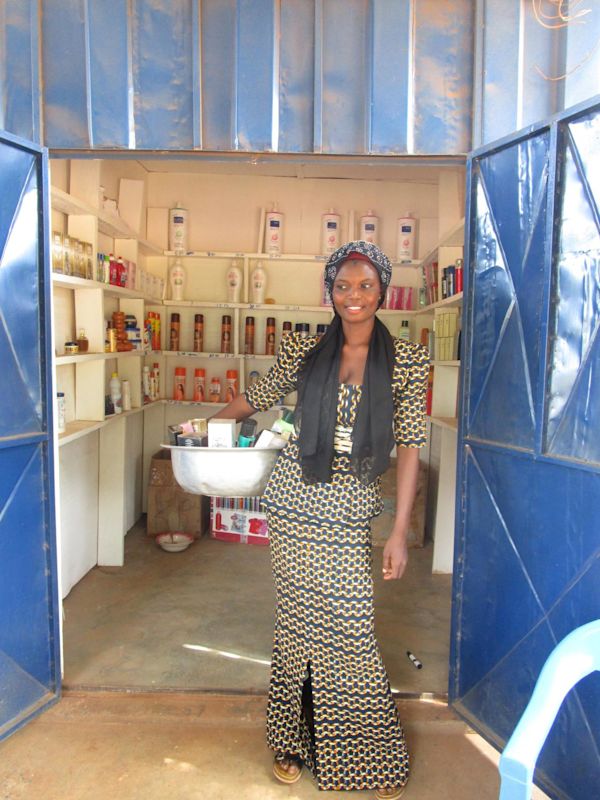Paying it forward: How “social interest” benefits borrowers and the community
October 25, 2016
To say Chereponi is off the beaten path may be an understatement. I arrived in this tiny town in the Northern region of Ghana after driving nearly 90 km on a rutted dirt road from the small city of Yendi, which had taken nearly two hours to reach from Camfed Ghana’s office in Tamale. We were close enough that, had time allowed, I could have walked across the border to the neighboring country of Togo. But that wasn’t the purpose of my visit — I had a very special Kiva borrower to meet.

Twenty-one year old Zuleatu lives in Chereponi with her grandfather, younger siblings, and large extended family. Their home has electricity, but she tells me that it works infrequently. (On the long drive into Chereponi I saw several hand-painted “No Lights, No Vote” signs — a caution to candidates in Ghana’s upcoming elections that their success in this region hinges on reliable electricity for the residents.)
Zuleatu runs a small cosmetics shop, selling pomade, powder, soaps, and perfumes. She tells me that business is slow sometimes, but the upcoming dry season holds the promise of better days as residents battle the Harmattan — dry, dusty winds that will soon be sweeping down from the Sahara — with copious amounts of moisturizer.
With support from Camfed Ghana, a U.K.-based NGO that focuses on girls’ education, Zuleatu graduated from high school in 2014 and joined CAMA, Camfed’s alumnae network. It was through CAMA that she learned about the Learner Guide program, which gives members business training, small grants to help them start their own ventures, and access to Kiva loans. Zuleatu used her grant to buy cosmetics to sell door to door, and one year later, took out her first interest-free Kiva loan of 1,000 GHS (approximately $275 USD) in order to build her own shop.

To call these particular Kiva loans interest-free isn’t entirely accurate. Camfed Ghana borrowers pay back what is called social interest by volunteering as mentors to local high school students, ususally serving in the same schools they themselves recently attended. They support students both academically and emotionally by organizing study groups, developing their leadership skills, and improving their self-esteem. The students benefit by having a positive role model — someone close to their own age and from their community who has likely dealt with many of the same challenges they are facing. And in addition to the help getting their businesses off the ground, the Learner Guides find their status in the communnity has been raised; they often receive the same respect given to teachers. That's what I call a win-win!
Zuleatu faced many obstacles during her first loan cycle, including her father becoming seriously ill. But despite having to pay his medical bills and support two younger brothers, she was able to fully repay her loan. She has since taken out a second Kiva loan of 3,000 GHS ($750 USD) which will allow her to expand her business, save money, and further her education. Fluent in French, she will soon be starting school to pursue her dream of becoming a French teacher.

After Zuleatu and I were done speaking, I was able to witness her business savvy firsthand. She walked into her shop, took something off the shelf, than came out and handed me a roll-on deodorant. Sensing my confusion, she mimed swiping it on her armpits, in case I wasn’t sure what it was for. This may have been a not-so-subtle hint — it was really hot that day! Unfortunately I had not brought any cedis with me, so I wasn’t able to reward her efforts with a purchase. But with her entrepreneurial spirit and career ambitions, I have no doubt that she will be successful with all her aspirations. Bonne chance Zuleatu!
To make a loan to a Camfed Ghana borrower on Kiva click here. If there are no active loans posted, check back later — new borrowers are coming!
PREVIOUS ARTICLE
Animals for Education in Vietnam →NEXT ARTICLE
Don’t Put All Your Eggs in One Basket: Modern Portfolio Theory in Rural Kenya →













